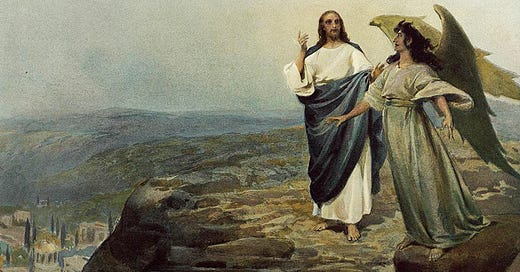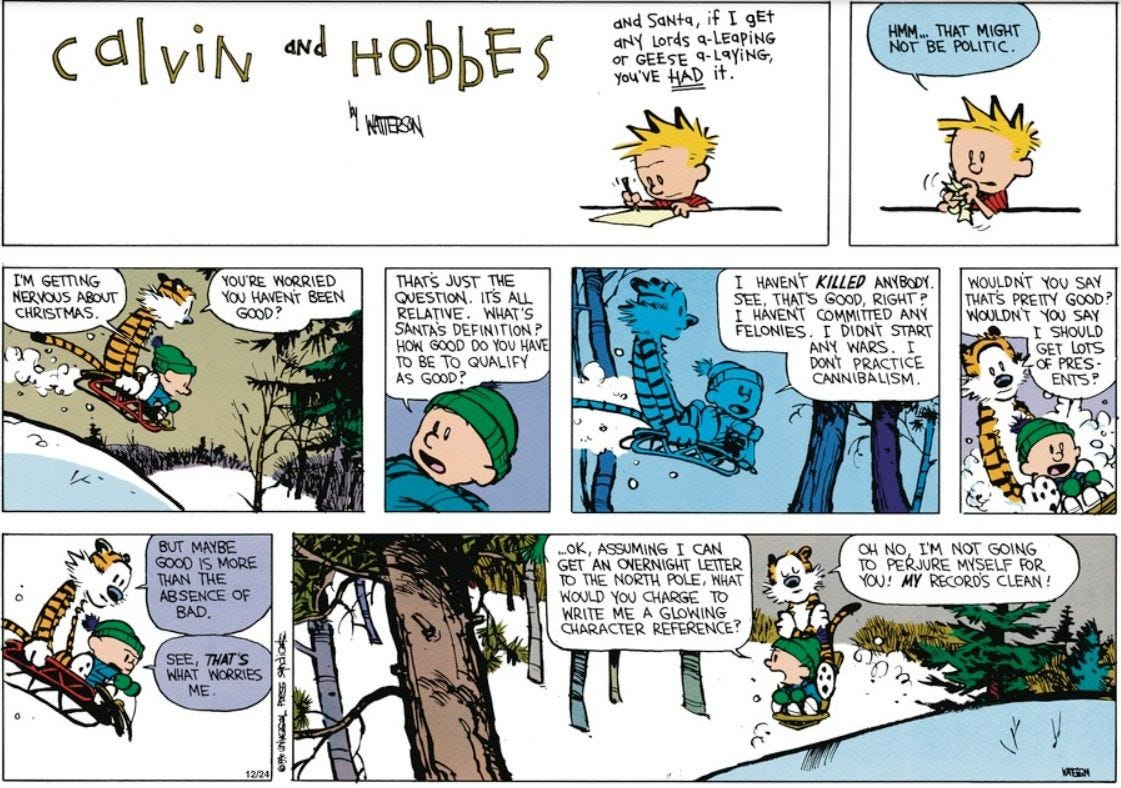Today’s Old Testament reading begins with a condensed recap of the Fall of Man story we read a few weeks ago. Which, you know, it’s Lent. Makes sense. Paul’s letter to the Romans compares Adam with Jesus (you can guess who comes out ahead in that comparison), which ties all the readings together nicely. And finally, my favorite Gospel passage, the Temptation of Christ in the Desert, which has many takeaway lessons to enjoy.
We’re only a few days into Lent. Have you been tempted to break your Lenten fast? I know I have. But Jesus’ temptations were far greater, so let’s all try to keep that in mind.
Reading 1
Gn 2:7-9; 3:1-7
The LORD God formed man out of the clay of the ground and blew into his nostrils the breath of life, and so man became a living being.
Then the LORD God planted a garden in Eden, in the east, and placed there the man whom he had formed. Out of the ground the LORD God made various trees grow that were delightful to look at and good for food, with the tree of life in the middle of the garden and the tree of the knowledge of good and evil.
Now the serpent was the most cunning of all the animals that the LORD God had made. The serpent asked the woman, "Did God really tell you not to eat from any of the trees in the garden?" The woman answered the serpent: "We may eat of the fruit of the trees in the garden; it is only about the fruit of the tree in the middle of the garden that God said, 'You shall not eat it or even touch it, lest you die.'" But the serpent said to the woman: "You certainly will not die! No, God knows well that the moment you eat of it your eyes will be opened and you will be like gods who know what is good and what is evil." The woman saw that the tree was good for food, pleasing to the eyes, and desirable for gaining wisdom. So she took some of its fruit and ate it; and she also gave some to her husband, who was with her, and he ate it. Then the eyes of both of them were opened, and they realized that they were naked; so they sewed fig leaves together and made loincloths for themselves.
Ancient Hebrew’s written language didn’t have vowels. You kinda had to infer them from context.1 "Naked" is generally vowelized to read eirom in Genesis, but in this particular passage, it’s rendered arum. Which then makes it sound similar to the Hebrew word for “cunning,” usually vowelized as arum.
The Serpent claims he’s offering wisdom, which seems good, but he’s actually offering cunning, the dark side of knowledge.
At the end of chapter 2, in a verse we skipped over today, it says, “The man and his wife were both naked, yet they felt no shame.” This time, the word for “naked” is arummim. It’s similar-sounding, but not identical. Adam and Eve were naked, but in the innocent way children are. It’s only in metaphorically “growing up” that they see something wrong with their bodies.
Responsorial Psalm
Ps 51:3-4, 5-6, 12-13, 14 and 17
R. Be merciful, O Lord, for we have sinned.
Have mercy on me, O God, in your goodness;
in the greatness of your compassion wipe out my offense.
Thoroughly wash me from my guilt
and of my sin cleanse me.
R. Be merciful, O Lord, for we have sinned.
For I acknowledge my offense,
and my sin is before me always:
"Against you only have I sinned,
and done what is evil in your sight."
R. Be merciful, O Lord, for we have sinned.
A clean heart create for me, O God,
and a steadfast spirit renew within me.
Cast me not out from your presence,
and your Holy Spirit take not from me.
R. Be merciful, O Lord, for we have sinned.
Give me back the joy of your salvation,
and a willing spirit sustain in me.
O Lord, open my lips,
and my mouth shall proclaim your praise.
R. Be merciful, O Lord, for we have sinned.
The first part of this Psalm asks for deliverance from sin. We want God to wipe out our offenses. We’ve acknowledged them, which is, of course, the first step.
The second part of the Psalm ask for something more: nearness to God, living by the spirit of God. We ask God to speak through us, to rightly proclaim His praise.
Forgiveness isn’t enough. It’s basically just getting us back to neutral, to “innocence.” But we want to be positively good.
Reading 2
Rom 5:12-19
Brothers and sisters: Through one man sin entered the world, and through sin, death, and thus death came to all men, inasmuch as all sinned— for up to the time of the law, sin was in the world, though sin is not accounted when there is no law. But death reigned from Adam to Moses, even over those who did not sin after the pattern of the trespass of Adam, who is the type of the one who was to come. But the gift is not like the transgression. For if by the transgression of the one, the many died, how much more did the grace of God and the gracious gift of the one man Jesus Christ overflow for the many. And the gift is not like the result of the one who sinned. For after one sin there was the judgment that brought condemnation; but the gift, after many transgressions, brought acquittal. For if, by the transgression of the one, death came to reign through that one, how much more will those who receive the abundance of grace and of the gift of justification come to reign in life through the one Jesus Christ. In conclusion, just as through one transgression condemnation came upon all, so, through one righteous act,
acquittal and life came to all. For just as through the disobedience of the one man the many were made sinners, so, through the obedience of the one, the many will be made righteous.
Sin, the power of death, came into the world through Adam and Eve. But it’s not like they’re the only ones who’ve ever sinned. We all have, still do, and will continue to sin.
But Jesus, who never sinned, is able to offer himself up for the sins of all of us. One sinful man tried to become like God; one sinless God became man. They’re mirrors of each other.
And now we get to choose whether to accept the gift of one or the other.
Verse Before the Gospel
Mt 4:4b
One does not live on bread alone,
but on every word that comes forth from the mouth of God.
This is an interesting lead-in to the Bible Verse Rap Battle we’re about to see.
Gospel
Mt 4:1-11
At that time Jesus was led by the Spirit into the desert to be tempted by the devil. He fasted for forty days and forty nights, and afterwards he was hungry. The tempter approached and said to him, "If you are the Son of God, command that these stones become loaves of bread." He said in reply, "It is written: One does not live on bread alone, but on every word that comes forth from the mouth of God."
Then the devil took him to the holy city, and made him stand on the parapet of the temple, and said to him, "If you are the Son of God, throw yourself down. For it is written: He will command his angels concerning you and with their hands they will support you, lest you dash your foot against a stone." Jesus answered him, "Again it is written, You shall not put the Lord, your God, to the test."
Then the devil took him up to a very high mountain, and showed him all the kingdoms of the world in their magnificence, and he said to him, "All these I shall give to you, if you will prostrate yourself and worship me." At this, Jesus said to him, "Get away, Satan! It is written: The Lord, your God, shall you worship and him alone shall you serve."
Then the devil left him and, behold, angels came and ministered to him.
As stated above, Jesus never sinned. He was tempted in a way that no one has ever been tempted, and yet was still able to resist.2
My favorite part of the story is the second temptation, when Satan quotes the 91st Psalm. He’s basically the smug atheist meme—
Taking Bible verses out of context is an old technique, used by the Devil himself. Don’t be fooled when someone tries to use it on you.
That’s why you’ll sometimes see Yahweh written as simply YHWH, to emphasize how ineffable, and unpronounceable, God’s name is.
Should make giving up coffee for Lent a breeze, right?







